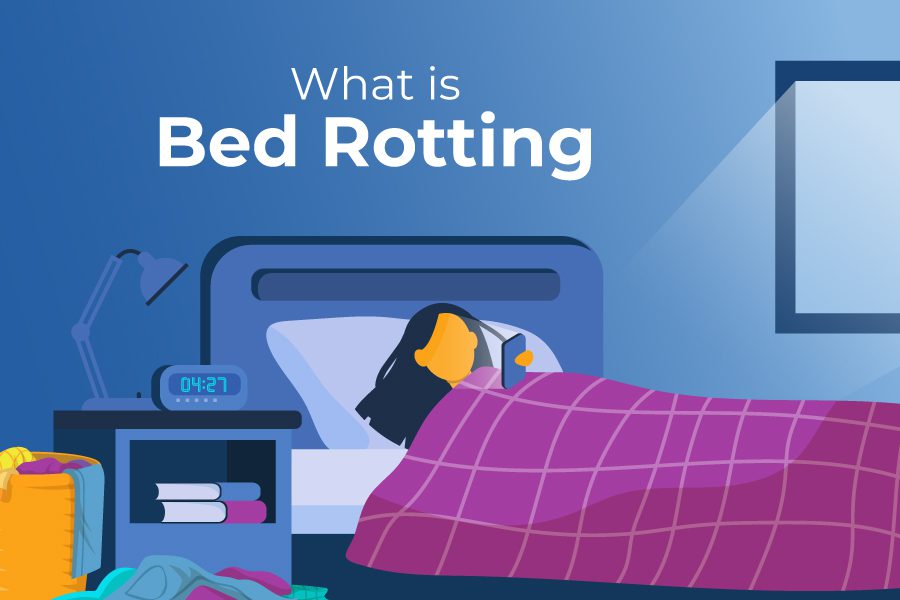Bed Rotting Trend
What Is Bed Rotting?
“Bed rotting” is a trending term often seen on social media that refers to spending hours lounging in bed watching television or scrolling on your phone.
Sometimes also referred to as “hurkle-durkling”, bed rotting has become popular on TikTok among the Generation Z (or Gen Z) age group.
The main theme of bed rotting involves spending an extended period of time relaxing without doing anything productive.
While there are benefits in taking time to just relax and unwind, this self-care trend can lead to spending too much time without moving or getting outside.
Healthcare professionals worry that this could lead to mental health problems and other issues.
Did you know that excessive bed rotting could actually make you more tired by affecting your sleep quality? Let’s dive into what exactly this social media trend is.
What Are the Ideas Behind Bed Rotting?
The main point of bed rotting is to allow yourself time to rest, recover, and recharge without feeling pressured to do something productive.
In today’s American society, we are definitely surrounded by a “hustle culture.” In other words, we live in a society where we are often pressured to be as productive as possible all the time.
This can lead some people to measure their self-worth by how productive they are, which can lead to a lot of negative impacts on mental health.
The point of bed rotting is to be able to escape the hustle and bustle for a little while without putting pressure on yourself to be busy.
For some people, this is a chance to process feelings of overwhelm and recover from stress and mental and emotional exhaustion.
For example, after a long week at work or school, someone might feel the need to have a bed rotting day to recharge.
This may be a form of self-care for them that leaves them feeling better mentally and physically.
Is It Okay to Have a Bed Rot Day?
Yes, there is no problem with having a bed rot day from time to time as long as you do it in moderation and don’t fall into unhealthy habits because of it.
For example, there is nothing wrong with feeling like you need to have a bed-rotting day to rest after a long or emotionally taxing week.
However, if it is something that you’re doing for the entire day all the time, it could become detrimental to your overall quality of life and your physical health.
What’s Wrong With Bed Rotting?
There’s nothing wrong with bed rotting when it is done in moderation. However, if you’re spending too much time doing it, it can affect your mental and physical wellness.
If you’re spending too much time in bed, then you’re likely not getting enough physical activity.
This can lead to weight gain, poor circulation, and a loss of physical strength.
If you’re not taking care of your physical health by getting enough exercise, this can lead to a lot of other health issues down the road.
Sleep experts have actually found that sleeping too much without exercising enough can actually make your ability to rest healthily worse over time.
From a mental standpoint, bed rotting can become a problem when you’re using it as a form of social isolation.
There’s nothing wrong with needing some alone time. However, too much alone time can cause you to disconnect from others, which could lead to loneliness, depression, and other mental health problems.
Another potential problem with bed rotting is if you are using it to avoid responsibilities or escape reality.
An example of this would be choosing to do this instead of taking care of your personal or professional responsibilities. This could also be a way of procrastinating.
Procrastination is an easy habit to fall into. However, doing it too much can actually lead to more stress by causing you to fall behind with your daily tasks.
What Are the Other Names for Bed Rotting?
Some people may refer to bed rotting using other items like “hurkle durkling”, taking a mental health day, or taking a rest day.
What Does Hurkle Durkle Mean?
“Hurkle Durkle” is a phrase that comes from Scottish and Northern English descent, which means lounging in bed or taking a break from being productive.
It could also be a phrase to describe someone who is taking a long time to get up in the morning or who is just not having a productive day.
Causes of Bed Rotting
What Causes Bed Rotting?
Some people choose to bed rot because they just need a mental, physical, or emotional break. For other people, it could be a sign of mental health problems.
Why Do Some People Bed Rot More than Others?
Some people bed rot more than others because they may be struggling with a mental health problem like anxiety, depression, or burnout.
When people are struggling with their mental health, getting up and facing the day can become a lot more difficult.
They may struggle with feeling tired and unmotivated.
The pressure of their different responsibilities can become overwhelming and too hard to deal with, so they may feel more tempted to stay in bed.
Some people may bed rot more than others because they are struggling with emotional exhaustion.
For example, maybe they are experiencing grief after losing a loved one. It’s also possible that they are dealing with another form of emotional pain, like heartbreak.
Introverts, in particular, may also bed rot more than others.
This could be simply because being around people for extended periods of time makes them feel drained. Bed rotting may be their way of allowing themselves the time and space to recharge.
Why Am I Bed Rotting So Much?
If you feel like you’re bed rotting more than usual, you may need to take a look at your mental and physical health and see if there are any possible issues.
There could be an underlying mental health issue that is contributing to your feeling the need to spend more time than usual in bed.
Consider if you’ve been feeling symptoms of anxiety or depression lately. While feeling stressed or down from time to time is normal, it can become an issue when it affects your overall quality of life.
Take the time to also consider your physical health. Have you been taking care of yourself lately by getting enough sleep, eating healthy, and making time for exercise?
If you have been overly exerting yourself lately at work or school, this could also lead to physical exhaustion.
If you feel like you can’t stop bed rotting, it may be connected to an underlying issue. Our team at Sandstone Care can help.
Bed Rotting Side Effects
What Are the Side Effects of Bed Rotting?
The TikTok trend bed rotting can be a good self-care activity every once in a while. However, doing it too much can lead to mental and physical health problems and other issues.
One of the most common issues that bed rotting can cause for your physical health is sleep issues.
Spending too much time in bed during the day can interrupt your body’s circadian rhythm. This can make it harder to fall asleep and stay asleep at night.
From a mental standpoint, too much bed rotting can make mental health issues like anxiety and depression worse, especially among young adults.
It can cause you to feel lonely, isolated, and disconnected from others. Laying in bed can also cause you to feel unmotivated or like you’re in a funk.
Another side effect of bed rotting can be how it impacts what you are able to accomplish in your daily life.
If you’re spending too much time in bed, you’re likely going to fall behind either at work or school. This can hold you back from accomplishing your goals.
From a social standpoint, a side effect of bed rotting can be how it impacts your relationships. Spending too much time in bed can cause you to lose touch with friends and prevent you from making new social connections.
It can even cause you to miss out on fun opportunities that could help you grow as a person.
What Does Bed Rotting Look Like?
Bed rotting can look different from person to person, but usually, it involves laying in bed, wearing comfortable clothing, and scrolling through social media.
For some people, bed rotting could involve “binge–watching” a bunch of episodes of a show in an entire day.
In the case of other people, it could involve playing video games, listening to music, or even reading a book from the comfort of their bed.
Is It Healthy to Stay In Bed All Day?
While there is nothing wrong with staying in bed for an extended period of time once in a while, doing it too much is not healthy.
Staying in bed all day occasionally could be a good way to rest or even to recover from sickness.
However, doing it all the time can lead to a lot of mental and physical health concerns and can affect your overall well-being.
What Happens if You Stay In Bed All Day Everyday?
Staying in bed all day, every day can lead to physical health issues and poor mental health.
What Does Bed Rotting Do to Your Body?
Too much bed rotting can affect your body by causing muscle weakness, weight gain, poor circulation, and joint pain.
It can also put you at greater risk of experiencing conditions like diabetes, obesity, or cardiovascular issues.
Bed Rotting Benefits
Why Can Bed Rotting Be a Good Thing?
Taking things slow from time to time, or “hurkle-durkling”, can be a good thing when it allows you a chance to rest and recharge.
Is Bed Rotting Self-Care?
Yes, bed rotting can be a form of self-care that allows you to take a break from the hustle and bustle of daily life.
However, doing it too much can lead to worsened mental, physical, and emotional health.
Is Rotting in Bed Healthy?
Rotting in bed can be okay occasionally, but doing it too much is not healthy.
How to Have a Good Bed Rot Day?
You can have a good bed rot day by setting up a cozy and comfortable environment, indulging in some of your favorite forms of entertainment, and remembering to set boundaries.
Setting boundaries may include reminding yourself that after a certain amount of time, you need to get up, get some physical activity in, and do something healthy or productive.
Bed Rotting Depression
Is Bed Rotting a Sign of Depression?
Bed rotting may be a sign of depression in some people.
Is Bed Rotting Just Depression?
Bed rotting can sometimes be a symptom of depression, but not everyone who does this is depressed. They could just be doing it to rest and recharge.
How to Handle Depression Without Bed Rotting?
You can handle depression without bed rotting by making time for activities that are going to benefit your mental, emotional, and physical health.
Some examples of healthier ways to handle depression could include:
- Making time for physical activity
- Connecting with family and friends
- Practicing mindfulness
- Working with a therapist
- Spending time out in nature
- Doing an activity that brings you joy
- Creating and sticking to a routine
- Setting small daily goals to stick to each day.
Bed Rotting ADHD
Why Do People With ADHD Bed Rot So Much?
People with ADHD may bed rot more often than other people because they become overstimulated and need a break.
Does Having ADHD Make It Hard to Get Out of Bed?
For some people with ADHD, it may be harder to get out of bed because they feel stressed and overwhelmed about the tasks they have ahead of them.
Some people with ADHD may also sleep dysregulation and procrastination, which can also make getting out of bed harder.
What Is the Burnout Cycle of ADHD?
The burnout cycle of ADHD usually includes hyperfocus, an energy crash, avoidance, and self-criticism.
When beginning a new project, they may feel very motivated and may even overcommit themselves.
After working for an extended time, though, they may become overwhelmed, burnout, and lose their motivation. At this point, they may practice avoidance by procrastinating their tasks.
This process is usually followed by feeling shame, self-criticism, or anxiety over how many tasks they still have to complete.
How to Stop Bed Rotting
How to Heal From Bed Rotting?
A great way to heal from bed rotting is to seek professional help for any mental or physical health problems, create a daily routine, and stick to that routine.
What to Do Instead of Bed Rotting?
Instead of laying in bed all day, consider scheduling blocks of time throughout the day where you can take a break or enjoy some self-care.
Remember to make time for the activities that give you joy and fulfillment. This includes time with family and friends.
It’s also important to make time to take care of your physical needs on a daily basis.
How To Help Someone Who Is Bed Rotting?
If you are worried that someone you know is bed rotting too much, reach out to them and share your concerns.
There is a chance there could be a deeper issue going on that they are dealing with.
For example, maybe they are struggling with an untreated mental health disorder like depression or anxiety. If this is the case, encourage them to speak with a mental health professional.
What to Do After Bed Rotting Stops?
Once you’ve broken the habit of bed rotting, do your best to stick to the routine that you created for yourself as much as possible.
Remember, you don’t have to feel guilty for treating yourself or doing self-care. Just make sure that this is all done in moderation.










